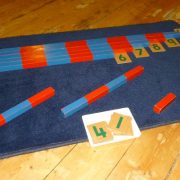What makes Montessori learning different from conventional learning?

Montessori learning is unique, which is why many of us have chosen it as the best way to help our children live and succeed in a world that is likely to hurl challenges at them at any given chance. It focuses on the inner drive to learn and develop, which is the core contrast between Montessori schools and more conventional schooling principles.
Conventional schools assume that children need incentives for learning (gold stars, great marks, awards) and if they don’t respond they must be punished with bad marks or trips to the principal’s office. Montessori schools assume the opposite; that little ones do not need to be forced to learn because, in fact, children are naturally interested in learning. Trevor Eissler – pilot, parent and author of four books including Montessori Madness – offers clear explanation of the essential differences between Montessori teaching and ‘regular’ teaching.
With three children who have learnt by Montessori, Eissler understands, first-hand, that Montessori stokes a child’s natural desire to know by promoting hands-on, self-paced, collaborative, challenging, joyful learning. Montessori encourages divergent thinking rather than convergent thinking; innovation as opposed to standardisation.

Montessori does all this with no marks, no tests and no homework because quite simply, there is no need. Montessori nurtures self-motivated through collaborative learning. Mixed-age classrooms (with three year age ranges) allow older students to be leaders and mentors as they help teach lessons while younger students have the experience of working with older class mates. Teachers move around the classroom working with students one-on-one or in small groups, rather than teaching from the front of the classroom trying to keep children on the same page, delivering a single piece of information.
Children who are working on different aspects of a subject sit near one another and are able to cross reference (even subconsciously) the information another child is working on. This enables Montessori children to understand why they’re learning what they’re learning and how it fits into the big picture, which allows them to take ownership of their learning – a critical element to fostering each child’s natural learning desire.
Montessori is also great at grabbing a student’s interest while it’s HOT. Children in Montessori follow their interests, wherever that passion leads them and however quickly it leads them there, regardless of what other children are working on.
Montessori fosters leadership, self-discipline, strong academics, independence, initiative and a lifetime love of learning. To find out more about what makes Montessori different, visit our Montessori page on the St Andrew’s website. Also have a look at Montessori Madness – a fun, explanatory video by Trevor Eissler.











